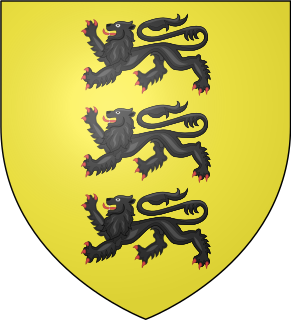| |||||
| Centuries: | |||||
|---|---|---|---|---|---|
| Decades: | |||||
| See also: | Other events of 1787 List of years in Ireland | ||||
Events from the year 1787 in Ireland.
| |||||
| Centuries: | |||||
|---|---|---|---|---|---|
| Decades: | |||||
| See also: | Other events of 1787 List of years in Ireland | ||||
Events from the year 1787 in Ireland.

Earl of Verulam is a title in the Peerage of the United Kingdom. It was created in 1815 for James Grimston, 4th Viscount Grimston. He was made Viscount Grimston at the same time. Verulam had previously represented St Albans in the House of Commons. In 1808 he had also succeeded his maternal cousin as tenth Lord Forrester. He was succeeded by his son, the second Earl.
Baron Dunboyne was a title first held by the Petit family some time after the Norman invasion of Ireland.

Baron Plunket, of Newtown in the County of Cork, is a title in the Peerage of the United Kingdom. It was created in 1827 for the prominent Irish lawyer and Whig politician William Plunket. He served as Lord Chancellor of Ireland from 1830 and 1834 and again from 1835 to 1841. His eldest son, the second Baron, was Bishop of Tuam, Killala and Achonry between 1839 and 1866. He was succeeded by his younger brother, the third Baron. He was a barrister. His eldest son, the fourth Baron, served as Archbishop of Dublin between 1884 and 1897. He was succeeded by his eldest son, the fifth Baron. He was a diplomat and held office as Governor of New Zealand between 1904 and 1910. His grandson, Patrick, the seventh Baron, was Equerry to both King George VI and Queen Elizabeth II. He was succeeded by his younger brother, Robin who died in 2013 and was in turn succeeded by his nephew, Tyrone who was a Page of Honour to Queen Elizabeth II. Two other members of the family have also gained distinction. The Hon. David Plunket, second son of the third Baron, was a Conservative politician and was created Baron Rathmore in 1895. The Most Reverend the Hon. Benjamin Plunket, second son of the fourth Baron, was Bishop of Meath from 1919 to 1925.

William Conyngham Plunket, 1st Baron Plunket, PC (Ire), QC was an Irish politician and lawyer. He served as Lord Chancellor of Ireland between 1830 and 1834 and again between 1835 and 1841.

The Strachey Baronetcy, of Sutton Court in the County of Somerset, England, is a title in the Baronetage of the United Kingdom. This family was originally seated at Walden, Essex where William Strachey was living under the rule of Edward VI. Later they moved to Surrey and at last settled at Sutton Court, Somerset. The title was created on 15 June 1801 for the politician and civil servant Henry Strachey. Sir Henry was private secretary to Lord Clive during his last expedition to India in 1764. He also took part in negotiations for peace with North America where he assisted the kings commissioners at Paris. He died in 1809 and was succeeded by his eldest son Henry, the second Baronet Strachey. His great-grandson, the fourth Baronet, was a Liberal politician. On 3 November 1911 he was created Baron Strachie, of Sutton Court in the County of Somerset, in the Peerage of the United Kingdom. He later served as Paymaster-General. The peerage became extinct on the death of his son, the second Baron, in 1973. The late Baron was succeeded in the baronetcy by his first cousin once removed, the sixth Baronet. He was the son of John Strachey, son and namesake of John Strachey, second son of the third Baronet. Strachey died January 2014 and did not use his title. Also, he had not successfully proven his succession and was therefore not on the Official Roll of the Baronetage, with the baronetcy considered dormant.
There have been seven baronetcies created for persons with the surname Palmer, two in the Baronetage of England, one each in the Baronetages of Ireland and of Great Britain and three in the Baronetage of the United Kingdom. Four of the creations are extant as of 2015, one of which became merged into the first grantee's later barony: Baron Palmer, the first baron being an heir to part of the Huntley & Palmers international biscuit business and a patron of music. The other current creations were awarded to a lawyer and politician of wealth under Charles II, to a South Sea Company director under George III and to a shipbuilder, shipbroker who was a Liberal statesman under Victoria.
The year 1766 in Ireland is characterised by certain events, arts and literature occurrences, births and deaths.
There have been nine baronetcies created for persons with the surname Lloyd, three in the Baronetage of England, three in the Baronetage of Great Britain and three in the Baronetage of the United Kingdom. Two of the creations are extant as of 2010.
Major General Henry Conyngham of Slane Castle was an Irish soldier and politician.
There have been two baronetcies created for persons with the surname Carden, one in the Baronetage of Ireland and one in the Baronetage of the United Kingdom. Both creations are extant as of 2010.
There have been five baronetcies created for persons with the surname Richardson, one in the Baronetage of Nova Scotia, one in the Baronetage of Ireland and three in the Baronetage of the United Kingdom.
John Butler, 12th Baron Dunboyne was an Irish clergyman and aristocrat, Roman Catholic Bishop of Cork and Ross. In order to advance his temporal title and marry he became, as of 2004, the only authenticated apostate in the Catholic hierarchy in Ireland
There have been four baronetcies created for persons with the surname O'Brien, one in the Baronetage of Ireland and three in the Baronetage of the United Kingdom.

John David Blake Butler was an English actor best known for his role as the lecherous chief librarian Mr. Wainwright during the first and third series of Last of the Summer Wine in 1973 and 1976 respectively.

There have been three baronetcies created for persons with the surname Carew, two in the Baronetage of England prior to 1707, one in the Baronetage of Great Britain.
Sir St George Gore-St George, 5th Baronet was an Anglo-Irish politician and baronet.
Francis Conyngham, 2nd Baron Conyngham was an Irish peer and politician.
Events from the year 1677 in Ireland.
Events from the year 1624 in Ireland.

Earl of Arran is a title in the Peerage of Ireland. It is not to be confused with the title Earl of Arran in the Peerage of Scotland. The two titles refer to different places: the Aran Islands in Ireland, and the Isle of Arran in Scotland. The Irish earldom is held by the Gore family. The Scottish earldom is a separate title, held as a subsidiary title of the Duke of Hamilton.